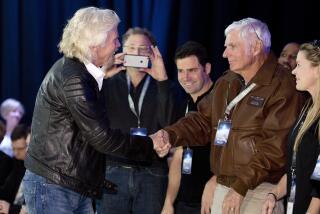Voyager Is Taking Flight Again--in Ads : Once-Wary Sponsors Rush to Embrace the Little Plane That Could
In the ads, it looks almost as if Voyager pilots Dick Rutan and Jeana Yeager didn’t really fly around the world alone--but instead had a gaggle of co-pilots with names like Mobil and Rolex.
And even though Voyager landed Dec. 23, that may actually have been its takeoff date as an advertising vehicle.
This week, a flood of corporate sponsors began to associate their products with--or even take some credit for--the experimental aircraft’s successful nonstop flight around the globe on a single load of fuel.
And while Voyager’s promoters envision a marketing campaign that could conceivably fly into the next century, some marketing moguls say the Voyager’s marketing life will stretch only for weeks--not years.
To be sure, Voyager is a once-in-a-lifetime event that one marketing executive compared to an Olympic Games, America’s Cup race and Statue of Liberty centennial celebration rolled into one. And while almost any company would be tickled to embrace the Voyager in its advertising, some marketing experts contend that overexposure could lead to public boredom--and perhaps even a buyer backlash.
“The flight is over,” said Thomas Caruso, editor of Marketing News, an industry trade magazine published by the American Marketing Assn. “I can’t see this continuing as a long-term thing. It’s a one-shot deal.”
Rutan and Yeager are trying to raise as much as $300,000 to pay off personal loans they took out for the project, Peter Riva, Voyager’s marketing manager, said. With book and motion picture rights still to be sold, those debts will probably be paid off in the next year, he said, and profits will then begin to flow.
At first, most corporations weren’t sure what to make of Voyager. Perhaps that is why, when sponsors were sought one year ago, only six could be found that were willing to stake $100,000 in cash or merchandise on the odd-looking aircraft. They were Mobil Oil; Audi of America; Beech Aircraft; Shaklee Corp., a San Francisco health food company; Teledyne Continental Motors of Mobile, Ala., which supplied the engine parts, and King Radio Inc. More recent sponsors include companies such as Rolex Watch and Hercules Inc.
And more are on the horizon. For example, at today’s Rose Parade in Pasadena, Voyager’s pilots will be waving from the Lawry’s Foods float. This despite a confession from a Voyager spokesmen that not even a pinch of Lawry Seasoning Salt was taken aboard the flight. An American Express card, however, did go along--just in case of an emergency landing, but American Express has yet to sign up as a sponsor.
Voyager’s merchandising life span may be as short as one more month, said Cochrane Chase, president of Cochrane Chase, Livingston & Co., a Newport Beach advertising firm.
“Remember how popular Mark Spitz was after the Olympics?” he asked. “It didn’t take long for that to die off.”
Longer Life Envisioned
But Riva says he envisions a 10- to 15-year shelf life for the project as it continues to attract more sponsors. “But there is a limit to this type of thing,” he said. “I wouldn’t want to see the pilots doing TV commercials for eight different companies.”
Until the aircraft landed safely, most of the original sponsors kept a low profile.
“No one wanted to be associated with another Challenger shuttle disaster,” said one marketing expert who asked not to be named.
So desperate for funding was the Voyager crew in the early going that organizers listened to virtually any corporate offers.
“We didn’t sell our souls,” Riva said, “but we might have if we had to.” Only cigarette and liquor sponsors were taboo from the start, Riva said.
One early sponsor was Mobil Oil, which supplied a high-grade, synthetic oil. On Tuesday, Mobil ran its first ad that links its synthetic oil with the Voyager. That, however, is not the first time that Mobil has linked its name to major aviation events.
‘One More Episode’
In the past, Mobil has advertised that everyone from the Wright brothers to Charles Lindbergh has used its oil.
“The Voyager gives us one more episode where our story can be told,” said Tom Collins, marketing manager in Mobil’s public relations department.
Similarly, Rolex is letting the world know that its watches were strapped to the wrists of the Voyager pilots. To be precise, a $5,500, 18-karat gold watch on Yeager’s wrist, and a $2,850 watch on Rutan’s. Rolex, which ran Voyager tie-in ads in four major newspapers this week, also made the timing devices used in Voyager’s so-called Mission Control room.
As in Mobil’s case, this type of advertising is not without precedent at Rolex. The company has widely advertised that Sir Edmund Hillary wore a Rolex when he climbed Mt. Everest. And Rolex has just signed an endorsement contract with test pilot Chuck Yeager.
“Rolex likes to sponsor elite, unusual activities that tie in with its demographics,” explained Chase.
Not everyone, however, has jumped on the Voyager bandwagon. Despite an early opportunity, Chrysler Chairman Lee A. Iacocca has kept his distance. When Voyager officials first approached Chrysler to sponsor the project, the company said the Voyager theme did not mesh with its current ad campaign. In fact, Voyager couldn’t sign a single American auto maker as a sponsor. In desperation, the group looked to Japan, but was even turned down by Toyota. Finally, Audi offered to provide cars for the group.
Now, the Voyager not only has a sponsoring car, but a Rose Parade float to boot. Although the flowery, gondola-shaped float belongs to Lawry’s, the two Voyager pilots will be its focus on New Year’s Day.
Lawry executives are hard-pressed to draw a clear connection between the firm’s seasoning salt and the little airplane that could, but that hasn’t stopped them from trying.
“It’s leaders recognizing leaders,” said Thomas N. Fuelling, Lawry’s chief executive. “We have a number of firsts to our credit.”
Like what?
Well, it’s hardly like the first unrefueled flight around the globe. But in 1953, Lawry’s notched a world’s first when it put dehydrated spaghetti sauce in foil pouches.
More to Read
Sign up for The Wild
We’ll help you find the best places to hike, bike and run, as well as the perfect silent spots for meditation and yoga.
You may occasionally receive promotional content from the Los Angeles Times.






